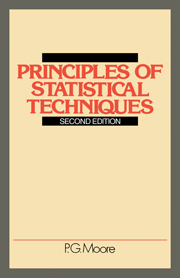 Principles of Statistical Techniques
Principles of Statistical Techniques Book contents
- Frontmatter
- Contents
- Preface
- 1 The Scope of Statistics
- 2 The Collection of Data
- 3 The Tabulation of Data
- 4 The Pictorial Representation of Data
- 5 Frequency Distributions
- 6 Averages
- 7 Measures of Dispersion
- 8 Probability and Sampling
- 9 The Binomial Theorem
- 10 Further Probability Concepts
- 11 Tests of Significance
- 12 Further Tests of Significance
- 13 Sampling Techniques
- 14 Simulation
- 15 Time Series
- 16 Pairs of Characters
- Solutions to Exercises
- Bibliography
- Index
13 - Sampling Techniques
Published online by Cambridge University Press: 03 February 2010
- Frontmatter
- Contents
- Preface
- 1 The Scope of Statistics
- 2 The Collection of Data
- 3 The Tabulation of Data
- 4 The Pictorial Representation of Data
- 5 Frequency Distributions
- 6 Averages
- 7 Measures of Dispersion
- 8 Probability and Sampling
- 9 The Binomial Theorem
- 10 Further Probability Concepts
- 11 Tests of Significance
- 12 Further Tests of Significance
- 13 Sampling Techniques
- 14 Simulation
- 15 Time Series
- 16 Pairs of Characters
- Solutions to Exercises
- Bibliography
- Index
Summary
Some of the basic ideas of sampling were introduced in chapter 8, but these ideas can now be taken a few stages further and linked in with a wider range of practical problems. The traditional method of acquiring knowledge about an aggregate of individuals (this aggregate is also sometimes referred to as a population or universe) is to enumerate them all. This is especially common in the economic field, for example, censuses of population, or of imports, or of production, or of distribution. These enumerations depend upon a complete count of all the individual human beings concerned, or the goods passing through Liverpool docks, etc. Until relatively recently governments have been entirely census-minded. The major statistics of agriculture, production, distribution, of the labour force and of unemployment have all been based on the census approach. Even for prices, where an exhaustive enumeration of each transaction is impossible to carry out, the tendency has always been to include as much as possible and to spread the cover of an index number over as many commodities as could conveniently be included. The index of retail prices that is published monthly provides an example of this tendency.
But censuses are expensive, even in a small country like our own. A population census is not normally attempted more than once every ten years. What is just as bad, a census may defeat its own object by resulting in such a mass of information that the collectors are snowed under.
- Type
- Chapter
- Information
- Principles of Statistical TechniquesA First Course from the Beginnings, for Schools and Universities, with Many Examples and Solutions, pp. 200 - 214Publisher: Cambridge University PressPrint publication year: 1969


